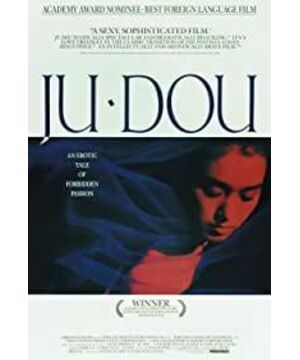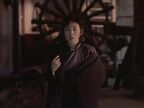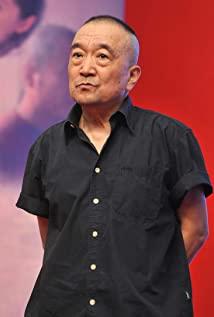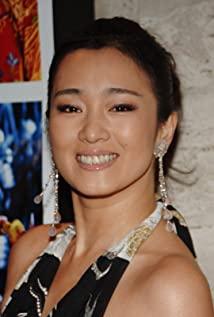The biggest feeling when I see it in the middle is anger and anxiety. Zhang Yimou always seems to make movies with such twists and turns. Or there are non-toxic but hideous long insects crawling around the heart. At one point, I regretted watching this movie, because there are not many movies with such a heart-wrenching plot nowadays, and it is really hard to break into this old world in this cage without any precautions. The consequence of being too involved in the play is that everyone looks disgusted, and it is almost impossible to extricate themselves.
I have to say that Zhang Yimou is very good at shooting Gong Li. Perhaps it was because the two used to be lovers. Gong Li's beauty, her unique vitality and tenacity, was clearly visible under his lens. All of Gong Li's beautiful gestures and depictions can be found in his films—whether it's a rural setting or a Shanghai beach-goer; it's also from his films that I realized Gong Li's unparalleled appeal. At this time, Gong Li was still very young, and her face was still immature, like green ears of wheat, sharp and full of fluff, full and full. Gong Li in "Judou" is like this. She merges with the rolling loess. She is new and vigorous. She has animal impulses and desires, and like a mother, people want to bury in her chest and cry. In this movie, you can see her iconic cry with the back of her hand over her mouth. She looks submissive and unwilling as a woman, but in the next second, she seems to wipe away her tears and the person she hates in her heart to fight to the death. You can also see her iconic gesture of raising her chin and asking questions, writing provocative, unyielding, publicity, sharp and determined eyes; even if she is fashionable and young, you can also see the prototype of her aura that will make people dare not object in the future. . She deserves to be the sexual enlightenment of many teenagers. Her thick and deep temperament is not difficult to approach, unlike some people whose snow-white face is very abrupt when stained with dust, but a tenacious reed in the wild, floating. Dang, her chest has the heat of a padded jacket and a stove. Who doesn't love Gong Li?
Contrasted with Gong Li (or Gong Li's self-improving and insignificant image in Zhang Yimou's films) is a man, a man with a big mouth, twisted and perverted and hated, and a coward who grew up under the big mouth, generous and courageous. man. Chrysanthemum beans are grass, she is holding a stone tightly on the cracked dry ground, she represents vitality and the drive to break through the world. However, Yang Tianqing disappointed her. The repeated kindness was just a synonym for fear and weakness dominated by etiquette. He enjoyed the rain brought to him by a woman like Judou who broke free from the dust. of dust. The slap he slapped Judou in the mourning hall revealed his selfishness as a man: he never regarded Judou as a woman equal to him, and there was only a thin line between him and Yang Jinshan's brutality and tyranny. . He doesn't trust the people he gets along with every day, but he is afraid of the invisible feudal system, and the women in his eyes should only be obedient, obedient, and obedient. What he loves is not Judou, but Judou's fragrant flesh and attachment to him. He was loyal enough, honest enough, enough to give Judou the care of the man she never had, but his cowardice also indirectly doomed Judou's death. Judou is a boat. The boat has the direction of the boat and the bow that can divide the waves, but there is no oars, and there is no power to break free from this dead sea; Yang Tianqing is not enough to be the oar of the boat, so she is forever trapped on the hopeless waves. This is not an uncommon portrayal of female images - outstanding, independent and independent women in literary and artistic works from generation to generation are trapped on the shore by the times and society because of the eternal shackles of 'female' identity. This is the case for generations in literary and artistic works. I don't know when women can be freed from this situation in reality. Judou is the only woman in the film, the only vivid color, a symbol representing the fertility and vitality of motherhood; while the Yang family's repressed and stereotyped relatives, the young people who talk in the alley, and even the terrifying son, It is the unanimous grass-killer, killing the last hopeful grass seed.
"Judou" is the predecessor of "Raise the Red Lantern", which is more vivid than the blurred face of the latter, and the language of the former can be seen in the latter. The more obvious similarity is the scene of the deep house compound, the hall is too large, the height is too high, like a giant's house, empty, and Judou is standing in it, which is very small and disproportionate to the proportion of people. An interesting point, Gong Li's image in other works is generally plump and healthy, only in Zhang Yimou's country films, he always looks thin). Such a huge house makes people wonder if it was specially built for filming, but the fact that it is a real ancient building can't help but make people even more frightening - a seemingly absurd story has a real scene as a carrier, and it is inevitable to guess here Has a similar story ever happened. The history, society, system, rules, morals, and secularism represented by ancient buildings are silent but huge, pressing on the head of every guest under the roof; It became more and more distorted - Yang Tianbai, the only descendant of the Yang family, was a fable, and the tight strings and the mountains squeezed by the times finally collapsed on his head. People are born and die in the mansion, but no one really owns the mansion; on the contrary, the mansion controls everything in the mansion, and the people who come and go are all passers-by that it does not care about. , suffocating, heavy and unshakable. The mansion was empty and cold, and there were few people. Even the compact and cramped small buildings outside the mansion were lifeless. The group of children singing and playing were bluntly placed inside, but they did not belong to those bricks and stones. Only corpses were removed from the mansion, but the corpses were always hidden. When fate was approaching, the pig was hoarse, the horse was carried away when he was sick, and Yang Jinshan was covered with a blue cloth with only half of his face exposed; old superstitions were unwilling to shape death, and all the sounds and shadows were metaphors for the terminally ill village. Another interesting arrangement is the nunnery where Judou asks for contraceptives. The nun actually has a contraceptive pill, which is lust; the contraceptive pill is actually chili noodles, which is greed for money. This nunnery is comparable to the Tiejian Temple in "A Dream of Red Mansions" - the Buddhist sect is heavily stained with copper, but the monks are more greedy than the secular people. Such villages cannot grow any new sprouts, and chrysanthemum beans are eventually pruned and stepped down. Only the remnant wind on the stone bridge swept the paper and copper coins all over the ground, which matched the village very well, desolate, desolate, sad, and hopeless. Coerced by all this, they want to cry, but they can't shed tears; Shen Zhai doesn't care about tears, others laugh at tears, cry themselves, and know that this life is absurd. What's there to cry about? Where is there not to cry?
Another similarity is the ending of Gong Li's destruction and madness under this oppression. Different from the fluttering figure in white clothes in "The Big Red Lantern", Judou chose to burn out the place she hated and fell in love with. Judou is not a young lady who has read books, although she did not come from the lofty ideal, nor can she return to the ideal of a student. She originally accepted her own destiny, but she was blindly bullied and humiliated; she grew up from the ground, her life is already low, the only way out is to struggle upward, eager to find a lifeline from the loess, and then look at the blue sky . Judou has no shell for her to shrink. She either kills her enemies and lets herself live, or hugs her lover to death without fear of rumors; she is straight and straightforward, her life is always in motion (rather than quiet and still), Will not deal with, will not bear humiliation, and will not compromise. She knows the taste of love. She is enthusiastic, resolute, and has a sustenance in her heart, so the raging flames complement her character, and she cannot be a soul of resentment and despair. Under the same general theme of feudal society's oppression of women, the fate of women in both films is closely linked to pregnancy and childbirth. Women, as reproductive tools, as resources that can be quantified in money, are only sexual symbols before children, and can be trampled on by arbitrary torture. In the eyes of men, they are one-sided playthings, and they do not need any personal respect and contempt for them. They bear the responsibility of inheriting the family, but they die one after another without even a decent funeral. In feudal society, women were accustomed to their situation - they had hatred and tears, but they dared not and could not have any objection to it. Any attempt to defy the will of society will inevitably lead to siege and destruction, and even women and women cannot be relied upon for each other; in most cases, the shadow of patriarchy not only erodes men but also devours women, making them mistakenly believe that they are fathers. The lackey of power is the right way. Judou made the mistake of pinning her hope of freedom on a man. She didn't realize that women's independence and self-improvement do not need and must not depend on anyone (it is true that the times did not give her the opportunity to have such awareness); because A man, even a rather simple and kind man like Yang Tianqing, will never stand on the same front as a woman. In a way, men who have grown up enjoying the privileges and bonuses of receiving all the compliments are even more cowardly than women, because they are in prison in the place where they were raised, and they dare not even challenge any system or authority. And women, after suffering enough insults and despair, are always willing to break through the layers of confinement - after all, they have nothing left, and even if they fail, the consequences of death are a relief for them. in two In the movie, Zhang Yimou saw the struggle of women, but in the end, he still framed a poor ending for women without authorization from the perspective of men. I believe this is the silent destination of most women in feudal society, but I don't think this is the doomed ending for women to separate from men, even under the weight of the times.
The victims of feudal society and patriarchy are not only women, but also the next generation who have been attacked. A child who grows up in a dysfunctional home does not see his mother's resentment, pain, and bruises. His father only teaches him rage, resentment, and wickedness, but never shows him a positive image of the world. So Yang Tianbai was taciturn, staring at him and clenching his fists, and eventually he grew into the gnawing appearance of his father. In this social environment, children are distorted and painful. Among the many male characters wearing black shirts, there is a lack of a mother's symbol, and the lack of soft and warm care from women. Yang Tianbai was told that his mother was a shameless slut, and was criticized by the neighbors in the alley for his mother's indiscretion; everything instigated him to hate this woman, but he couldn't hate his own mother. Yang Jinshan's purpose is to educate him to love his nominal father, even if he is a paralyzed man with a face full of greed; the values he is exposed to are reversed, and he has lived in confusion about social roles and etiquette and integrity from the very beginning. . In the end, the many evil consequences of the patriarchal family are manifested in Yang Tianbai's anti-social personality - he uses violence to control violence, reverses right and wrong, and laughs when he kills, which is a more terrifying image because of simplicity. He transferred his anger and hatred towards his mother to Yang Tianqing, and attributed all the rumors and misfortunes to his mother's favorite man; the father should be right, the mother should be right, then the only sin is Yang Tianqing, An incestuous older brother, an unrecognizable biological father, a villain who seduces his mother, the source of all rumors... He cannot understand the relationship between his mother and Yang Tianqing, and will continue Yang Jinshan's brutality; as a microcosm of the cohesion of the patriarchal society, Ju Dou was the first woman he personally killed, but he won't be the last.
This film cannot be viewed purely from the perspective of an ethical film. Ethics is certainly the main dramatic conflict in it, but the film's purpose and accusation is not just a twisted three-person relationship, otherwise it's underestimating its true focus. The relationship between Judou and Yang Tianqing highlights the struggle and resistance to the feudal society. This extraordinary behavior was initiated by Judou, which is also her attempt to break various rules and acquiesced indifference to human nature and women. Much has been said about the poisoning of traditional dogma to all people in society and the pain of women's broken feet. The subtlety of the setting of Yangjia Dyeing Workshop lies in these ancient deep dyeing vats; it not only symbolizes the erosion of people by society, but also the illegitimate feelings in the Yang family's house. Corresponding to the dyeing workshop are the names of two men surnamed Yang, innocence, innocence is false, impure color is true; a piece of cloth goes through dyeing, washing and drying day and night, just like each character is covered with gold and silver. Eros dyes, loses innocence. In several scenes, it can be seen that Yang Tianbai's hands are dyed blue with indigo, and blue is the complementary color opposite to red, which actually alludes to his blood-stained red hands. When Judou woke up from the coma and struggled to climb down the stairs, when she raised the torch in horror, and when Yang Tianbai stopped by the dye pool twice, all the characters fell into the inevitable reincarnation of fate. Judou's immobile legs resembled the paralyzed Yang Jinshan, but one was to prevent death and the other was to create death. Two men died in the water, which is a symbol of women; and Judou died of a man, which is a symbol of fire. It's just that the men who bear the original sin of patriarchy are only worthy of drowning in a big dye vat that is not white, but the chrysanthemum beans in the fire can really return to the dust under their feet. The death of the men is passive, especially ironically they died at the hands of their sons, which is the retribution of sin against them; Judou's death is active, this may be a bit of kindness of the screenwriter, let this woman who can't help her life all her life. to face death by itself.
This is the epitome of the times, and it is the unspeakable pain of women for thousands of years. As a pair of eyes, "Judou" solemnly watched the inhumane story in the house. There is no answer to whether the idea of feudal society has only changed its name and is still raging, and how much progress is today's female consciousness compared with feudal society.
View more about Ju Dou reviews










